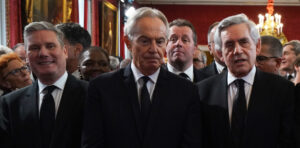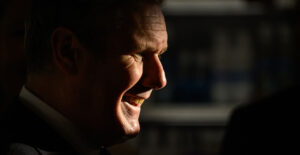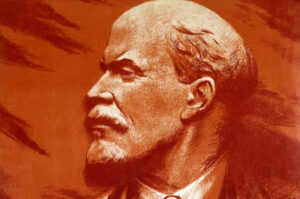All anyone could think about was clothes. As the members of the first Labour Cabinet prepared to collect their seals of office — having formed a government 100 years ago today — the gravity of the occasion was almost lost amid sartorial consternations. As only a few of the new Ministers of the Crown had previous ministerial experience, most lacked the requisite dress. Conscious of this, King George V set aside the usual requirements. John Wheatley, an Irish-born miner and the incoming Minister for Health, defiantly wore a ten-year-old lounge suit. Most of his colleagues, however, did their best to conform. A press photographer captured the “arrival on foot of the tall lanky figure of Noel Buxton and the short Sidney Webb with his nanny-goat beard, both clad in knee breeches and evening dress, white shirt and tails”. Labour Left-wingers were outraged, while the future Labour Chancellor Hugh Dalton thought the duo looked “ridiculous”.
Fashion is never just about utility, and these first-day uniform anxieties would come to symbolise all the tensions at the heart of the first Labour government, all its neuroses of class, radicalism and ideological purity. To whom did it owe allegiance: its working-class roots, its intellectuals or its own party machine? Some of its members simply wanted to disprove Winston Churchill’s notorious assertion that they weren’t “fit to govern”, conforming to the standards of previous administrations in order to establish a beachhead in the British Establishment. Others were more impatient. They wanted to demonstrate that a socialist government owed more to its voters than dressing up. Ramsay MacDonald, the illegitimate son of a farmhand who had the previous day kissed hands as Prime Minister, belonged in the former camp. In an interview with the New Leader, he turned the argument against his critics:
“I have known people who showed vanity by the clumsiness of their clothes. A tattered hat and a red tie, a tone of voice and religious repetition of Marxian phrases, may be as indicative of a man who has sold himself to appearances as the possession of a ceremonial dress to enable him to attend ceremonies which are historical parts of his duties.”
As Ethel Snowden (Chancellor Philip’s wife) observed in The Spectator, had ministers attended Court functions “in hobnailed boots, with unwashed faces and collarless shirts”, they would “quickly have [attracted] deserved contempt and ignominy”. Meanwhile, MacDonald himself could see the bigger picture. And his account of a historic day betrayed both his shock at what had just happened, as well as his apprehension at what was to come: “Without fuss, the firing of guns, the flying of new flags, the Labour Gov[ernmen]t has come in… Now for burdens & worries. Our greatest difficulties will be to get to work. Our purposes need preparation, & during preparation we shall appear to be doing nothing – and to our own people to be breaking our pledges.”
This was prescient. Over the next nine months Britain’s first Labour Prime Minister would find himself battling on a number of fronts: for acceptance by voters, co-operation with not one but two opposition parties in Parliament (Liberals and Conservatives) and most of all for support from his own colleagues, many of whom were deeply uneasy that a party with only 191 MPs had taken office at all.
The Labour Party as represented in Parliament was complex. Its structure betrayed its chaotic inception, more a fusion of local bodies and ideological factions than a combined party under a unitary authority. The civil servant Percy Grigg described a “Trade Union element”, which was more interested in moderate “bread and butter” politics than the abstract economic and social doctrine favoured by the party’s faction of “intellectuals”. And this second grouping included both former Liberals and those who had emerged from the Independent Labour Party (ILP), a separate but affiliated group. Grigg called the ILP-ers “Montagnards” after the most radical political group during the French Revolution, and remarked they followed “the lead of the Clyde in Scotland and Mr. [George] Lansbury in England”. Inclined to be unhappy at the moderation displayed by the trade unionists and intellectuals, the Montagnards would only be satisfied with the building of the New Jerusalem.
But for their political opponents and the press, Labour was singular, lumped together as the “wild men”. As it would turn out, they were far from wild, and that was part of their problem. After two months in government, Ramsay MacDonald — consumed by international as well as domestic affairs — grew concerned at the failure of his backbenchers to respond adequately to the “new conditions”. Some of what he called the “disappointed ones” had become “as hostile as though they were not of us”. He was thinking of malcontents like E. D. Morel, the campaigning journalist, and George Lansbury, a future Labour leader. “I am thoroughly distressed about the Party,” Lansbury had told Beatrice Webb in the middle of March:
“Everybody seems so thoroughly cheerful, and thoroughly content with what we are doing, and yet we are doing nothing that is of any real worth. I certainly think the fact that we are so very satisfactory to our opponents… and so very unsatisfactory to the poor devils on whose votes people like me got into Parliament, is a tragedy of the first water.”
Webb herself did not accuse MacDonald of treachery (“for he was never a socialist”) she saw him as “a believer in individualist political democracy tempered in its expression by utopian socialism”. Where he had “lacked integrity”, she added, was, “in posing as a socialist, and occasionally using revolutionary jargon. If he succeeds in getting a majority of the electors into this revised version of reformist conservatism embodied in the Labour Party machine, things will move forward.” It seemed doubtful that the Prime Minister would have regarded this as a criticism, for “reformist conservatism” was truly his whole aim in office, as it had been in opposition. This isn’t to say his short government was inactive. MacDonald worked hard to make John Wheatley’s housing legislation a reality, formally recognised the Soviet Union and brokered a new settlement between France and Germany, something he hoped would boost trade as well as soothing post-war wounds. But with only 191 MPs, and a ministry dependent on Liberal votes, he couldn’t do everything.
When ministers in the first Labour government pointed out this Liberal support was a necessary evil to remain in office, critics insisted “that it would be better to go down with colours flying than to lower the flag in the hope of keeping the ship afloat”. The MP Frederick Pethick-Lawrence occupied a “middle position”, sharing disappointment “at the apparent inaction” but also believing “the country would have been annoyed if the Prime Minister, having taken office, had almost immediately courted defeat”. This alluded to a strategy favoured by the Left of the party and feared by Conservatives like Lord Birkenhead:
“[Labour would] bring in a Budget, which might include a Levy on Capital, increase of Death Duties and Super-tax. This would, naturally, be defeated in Parliament and then Mr. Ramsay MacDonald would go to the country with what would be regarded by the mass of the electorate as the most popular Budget that had ever been produced. The Labour Party would sweep the country and be in office for the next 5 years.”
This fanciful scenario, however, was never in MacDonald’s mind, and when Philip Snowden’s first (and only) Budget was unveiled in April, its provisions channelled Gladstone rather than Marx, attracting a chorus of approval from many Liberals and Conservatives. Hardly anyone noticed the absence of a capital levy (wealth tax), which had been the centrepiece of Labour’s manifesto in the December 1923 election. Instead, like the apostle Paul, the Labour Party put away such childish things and chose the moderate, constructive path. And although this made it, to quote Fenner Brockway, “a Social Reform Government rather than a Socialist Government, a Liberal Government rather than a Labour Government”, the fact remained that it managed to be in office as well as in power, which was the only means by which it could deliver anything at all.
The rest of the MacDonald story is well known. His first administration lost a confidence vote in October 1924 and took its case to the country, only for the fabricated Zinoviev Letter (which called for Communist sedition and therefore stoked fears of a “red menace”) to derail the election and drive voters back to the Conservatives for five years. In June 1929 Ramsay returned as the prime minister of another minority government, although this time Labour was the single largest party with 287 seats. In the midst of rising unemployment and a sterling crisis, the government agreed to resign in August 1931, but then the King persuaded MacDonald to head a “National” government. Labour’s National Executive Committee voted to expel all those who remained in office, and in the election that followed, the National government was returned with a majority of nearly 500 (mostly Tories) and the “official” Labour Party was reduced to just 52 MPs.
This became known within the Labour movement as the “great betrayal”, and it took (as David Marquand has argued) some time for the Labour Party to get over its “complex” about MacDonald. Surveying events from the perspective of 1937, the future Prime Minister Clement Attlee did not doubt the “utility” of his party’s determination in 1924 to prove that Labour men and women could “administer the country”. And, he added cautiously, “the British elector is very sceptical of anything which he has not seen. The mere formation of a Labour Government and its existence for nine months registered a vital change in the political situation. Henceforth Labour was the alternative Government.”
Ramsay MacDonald and his colleagues had been dealt a very difficult hand which, for the most part, they played surprisingly well. This had not been guaranteed. The fledgling ministers might have been a disaster, spooking the City of London, offending the King and alienating moderate voters by attempting to pass “extreme” measures. The Labour Party might have been rendered unelectable. But that did not happen, in large part due to the skill of its leader. As a result, the “wild men” so feared in late 1923 had, within the space of an eventful year, shown they were competent men after all. Labour, contrary to Winston Churchill’s wounding assertion, were fit to govern. But this only begged the question that has dogged them since: who were they there to govern for?
Disclaimer
Some of the posts we share are controversial and we do not necessarily agree with them in the whole extend. Sometimes we agree with the content or part of it but we do not agree with the narration or language. Nevertheless we find them somehow interesting, valuable and/or informative or we share them, because we strongly believe in freedom of speech, free press and journalism. We strongly encourage you to have a critical approach to all the content, do your own research and analysis to build your own opinion.
We would be glad to have your feedback.
Source: UnHerd Read the original article here: https://unherd.com/




